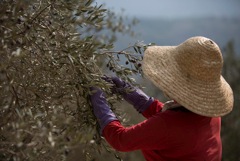Codex filming in Lebanon

A camera crew from Flooded Cellar are currently in Lebanon making a video for Codex that looks at the relevance and importance of Codex standards, guidelines and codes of practices to the Near East region.
The video will include interviews with government representatives, technicians from the national food safety committee, representatives from research and the Ministry of Agriculture, as well as those involved in food production, right along the food chain to restaurants and consumers. The video will examine Good Hygienic Practice (GHP), from "field to fork".
This week the team have been out shooting the olive harvest and olive processing.
In the field
Good pest management is vital. Olives are collected on clean nets and cloths (avoiding picking up olives from the ground). Workers use gloves and sort olives at the point of harvest to remove leaves and bad olives.
At the press
The environment needs to be extremely clean and hygienic. The press visited has been fully modernised with tiled walls and double doors to keep dust and flies out. Workers wear hair coverings and overalls as they sort and clean the olives.
Standards
A high proportion of producers and processors have not traditionally applied international safety standards as as they've always worked purely for local consumption. For export, obviously, they need to consider a whole different level of standards. The government is encouraging best practice and working to improve implementation.
Recycling waste
The processing plant also recyles the waste from the olive pressing into fuel logs, so that no waste is left lying around attracting rats.
Photo gallery
Links
Codex General Principles of Food Hygiene (CAC/RCP 1-1969)
Codex Standard for Table Olives (CODEX STAN 66-1981)
Photo Credit:
©Flooded Cellar
At the heart of the Codex mandate are the core values of collaboration, inclusiveness, consensus building and transparency. Governmental and non-governmental, public and private organizations alike play a vital role in ensuring Codex texts are of the highest quality and based on sound science.
Codex would have little authority in the field of international standard setting if it did not welcome and acknowledge the valuable contributions made by observers. Expert technical bodies, industry and consumer associations
contribute to the standard-setting process in a spirit of openness, collaboration and transparency.
Intergovernmental organizations (IGOs) and international non-governmental organizations (NGOs) can apply for observer status in Codex in order to attend and put forward their views at every stage of the standard-setting process.
 Current Codex Alimentarius Commission
Current Codex Alimentarius Commission
Codex filming in Lebanon

A camera crew from Flooded Cellar are currently in Lebanon making a video for Codex that looks at the relevance and importance of Codex standards, guidelines and codes of practices to the Near East region.
The video will include interviews with government representatives, technicians from the national food safety committee, representatives from research and the Ministry of Agriculture, as well as those involved in food production, right along the food chain to restaurants and consumers. The video will examine Good Hygienic Practice (GHP), from "field to fork".
This week the team have been out shooting the olive harvest and olive processing.
In the field
Good pest management is vital. Olives are collected on clean nets and cloths (avoiding picking up olives from the ground). Workers use gloves and sort olives at the point of harvest to remove leaves and bad olives.
At the press
The environment needs to be extremely clean and hygienic. The press visited has been fully modernised with tiled walls and double doors to keep dust and flies out. Workers wear hair coverings and overalls as they sort and clean the olives.
Standards
A high proportion of producers and processors have not traditionally applied international safety standards as as they've always worked purely for local consumption. For export, obviously, they need to consider a whole different level of standards. The government is encouraging best practice and working to improve implementation.
Recycling waste
The processing plant also recyles the waste from the olive pressing into fuel logs, so that no waste is left lying around attracting rats.
Photo gallery
Links
Codex General Principles of Food Hygiene (CAC/RCP 1-1969)
Codex Standard for Table Olives (CODEX STAN 66-1981)
Photo Credit:
©Flooded Cellar
 Codex and Observer
Codex and Observer
around the world since ancient times.
We might not always know where it comes from,
but we expect it to be available, safe and of good quality.









Leave a comment